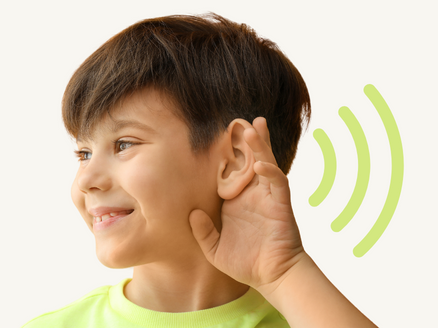Hearing loss isn't just for grown-ups—it can affect kids too. In fact, about 2 in every 1,000 newborns face permanent hearing loss, and by the time they're 18, almost 1 in 5 kids have some hearing challenges (Centers for Disease Control and Prevention, 2021; Lieu et al., 2020).
Kids can have different types of hearing loss, either from birth or developing later. It might impact one or both ears, and the severity can vary. Causes include genetic factors, infections, birth complications, medications, and exposure to loud noises.
Conditions like auditory processing disorder and middle ear infections can also impact hearing ability. Quick attention to middle ear infections is crucial, as they can affect speech and language development.
Hearing loss – even if it’s mild – can significantly affect a child’s language development. This can impact speech, communication, and learning. Studies show that childhood hearing loss can affect literacy and academic success later on (Werfel, K., 2017).
The good news is that the Early Hearing Detection and Intervention (EHDI) aims to catch hearing loss early. The Newborn Hearing Screening program, required by the Newborn and Infant Hearing Screening and Intervention Act of 1999, ensures that all US-born infants get a hearing screening before leaving the hospital. Regular screenings during childhood help catch any later onset hearing loss.
If a child doesn't pass a hearing screening, an audiologist will do more tests. If hearing loss is found, a team of professionals, led by the audiologist, will create a treatment plan. This might include speech/language therapy, auditory training, hearing aids, cochlear implants, or other interventions. Detecting and treating hearing loss early is the key for better outcomes.
Parents should know the signs of hearing loss in kids, like not responding to loud noises, delayed speech, trouble following instructions, or challenges in school and social situations. If you notice these signs, it's important to consult a licensed audiologist or ear, nose, and throat (ENT) specialist for further evaluation.
At ENT and Allergy Associates, we have a team of experts ready to help with the diagnosis and guide you through any needed rehabilitation. If you suspect hearing issues in your child, don't hesitate to seek professional help promptly.
Citations:
Lieu JEC, Kenna M, Anne S, Davidson L. Hearing Loss in Children: A Review. JAMA. 2020;324(21):2195–2205. doi:10.1001/jama.2020.17647
Werfel, Krystal. (2017). Emergent Literacy Skills in Preschool Children With Hearing Loss Who Use Spoken Language: Initial Findings From the Early Language and Literacy Acquisition (ELLA) Study. Language, Speech, and Hearing Services in Schools. 48. 249-259. 10.1044/2017_LSHSS-17-0023.


[2].png)